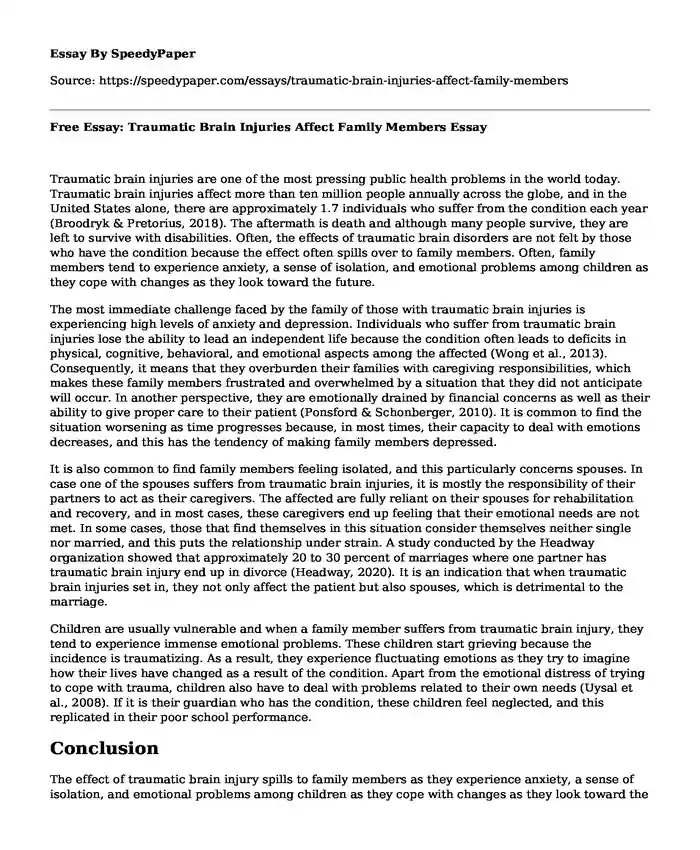
| Type of paper: | Research paper |
| Categories: | Family Healthcare Anxiety disorder Behavior change |
| Pages: | 3 |
| Wordcount: | 752 words |
Traumatic brain injuries are one of the most pressing public health problems in the world today. Traumatic brain injuries affect more than ten million people annually across the globe, and in the United States alone, there are approximately 1.7 individuals who suffer from the condition each year (Broodryk & Pretorius, 2018). The aftermath is death and although many people survive, they are left to survive with disabilities. Often, the effects of traumatic brain disorders are not felt by those who have the condition because the effect often spills over to family members. Often, family members tend to experience anxiety, a sense of isolation, and emotional problems among children as they cope with changes as they look toward the future.
The most immediate challenge faced by the family of those with traumatic brain injuries is experiencing high levels of anxiety and depression. Individuals who suffer from traumatic brain injuries lose the ability to lead an independent life because the condition often leads to deficits in physical, cognitive, behavioral, and emotional aspects among the affected (Wong et al., 2013). Consequently, it means that they overburden their families with caregiving responsibilities, which makes these family members frustrated and overwhelmed by a situation that they did not anticipate will occur. In another perspective, they are emotionally drained by financial concerns as well as their ability to give proper care to their patient (Ponsford & Schonberger, 2010). It is common to find the situation worsening as time progresses because, in most times, their capacity to deal with emotions decreases, and this has the tendency of making family members depressed.
It is also common to find family members feeling isolated, and this particularly concerns spouses. In case one of the spouses suffers from traumatic brain injuries, it is mostly the responsibility of their partners to act as their caregivers. The affected are fully reliant on their spouses for rehabilitation and recovery, and in most cases, these caregivers end up feeling that their emotional needs are not met. In some cases, those that find themselves in this situation consider themselves neither single nor married, and this puts the relationship under strain. A study conducted by the Headway organization showed that approximately 20 to 30 percent of marriages where one partner has traumatic brain injury end up in divorce (Headway, 2020). It is an indication that when traumatic brain injuries set in, they not only affect the patient but also spouses, which is detrimental to the marriage.
Children are usually vulnerable and when a family member suffers from traumatic brain injury, they tend to experience immense emotional problems. These children start grieving because the incidence is traumatizing. As a result, they experience fluctuating emotions as they try to imagine how their lives have changed as a result of the condition. Apart from the emotional distress of trying to cope with trauma, children also have to deal with problems related to their own needs (Uysal et al., 2008). If it is their guardian who has the condition, these children feel neglected, and this replicated in their poor school performance.
Conclusion
The effect of traumatic brain injury spills to family members as they experience anxiety, a sense of isolation, and emotional problems among children as they cope with changes as they look toward the future. It is for this reason that it is right for one to claim that family members are the real victims because they suffer more than the injured person since these family members have a clearer insight into the problem. No family is ever prepared for such a situation, and it is for this reason that non-family members should be concerned about offering emotional, and financial support to the patient's family members to ease their pain.
References
Broodryk, M., & Pretorius, C. (2018). Initial experiences of family caregivers of survivors of a traumatic brain injury. African Journal Of Disability, 4(1). https://doi.org/10.4102/ajod.v4i1.165
Headway. (2020). Family reaction to a brain injury. Headway.org.uk. Retrieved 5 March 2020, from https://www.headway.org.uk/about-brain-injury/individuals/caring/family-reaction-to-a-brain-injury/.
Ponsford, J., & Schonberger, M. (2010). Family functioning and emotional state two and five years after traumatic brain injury. Journal of The International Neuropsychological Society, 16(2), 306-317. https://doi.org/10.1017/s1355617709991342
Uysal, S., Hibbard, M., Robillard, D., Pappadopulos, E., & Jaffe, M. (2008). The Effect of Parental Traumatic Brain Injury on Parenting and Child Behavior. Journal of Head Trauma Rehabilitation, 13(6), 57-71. https://doi.org/10.1097/00001199-199812000-00007
Wong, D., Dahm, J., & Ponsford, J. (2013). Factor structure of the Depression Anxiety Stress Scales in individuals with traumatic brain injury. Brain Injury, 27(12), 1377-1382. https://doi.org/10.3109/02699052.2013.823662
Cite this page
Free Essay: Traumatic Brain Injuries Affect Family Members. (2023, Apr 18). Retrieved from https://speedypaper.com/essays/traumatic-brain-injuries-affect-family-members
Request Removal
If you are the original author of this essay and no longer wish to have it published on the SpeedyPaper website, please click below to request its removal:
- Essay Example on Behavioral Intervention Strategies for ASD Patients
- Essay Sample on Generational Differences at Workplace
- Free Essay: Intervention Plan Design for Developing the Compliance Program
- Free Essay with an Article Summary about Project GLOBE
- Paper Example: Professional Nursing and State-Level Regulations
- Five Schools of Behaviorism - Free Essay
- Essay on Public Health and Disability: Addressing Challenges, Enhancing Lives
Popular categories




